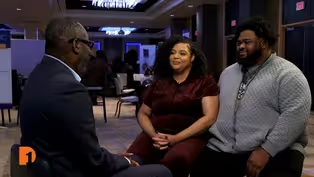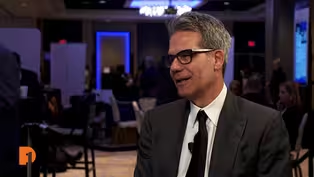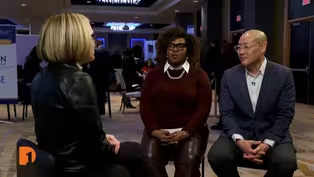
Ford invests in the future of mobility in the Motor City
Clip: Season 9 Episode 31 | 5m 56sVideo has Closed Captions
Michigan Central COO Carolina Pluszczynski talks about investing in the future of mobility.
Michigan Central in Detroit includes Ford’s recently renovated train station as well as Newlab, which is home to more than 100 startups. One Detroit contributor Nolan Finley, editorial page editor at The Detroit News, talks with Michigan Central Chief Operating Officer Carolina Pluszczynski about investing in the future of mobility in the Motor City at the Detroit Policy Conference.
Problems playing video? | Closed Captioning Feedback
Problems playing video? | Closed Captioning Feedback
One Detroit is a local public television program presented by Detroit PBS

Ford invests in the future of mobility in the Motor City
Clip: Season 9 Episode 31 | 5m 56sVideo has Closed Captions
Michigan Central in Detroit includes Ford’s recently renovated train station as well as Newlab, which is home to more than 100 startups. One Detroit contributor Nolan Finley, editorial page editor at The Detroit News, talks with Michigan Central Chief Operating Officer Carolina Pluszczynski about investing in the future of mobility in the Motor City at the Detroit Policy Conference.
Problems playing video? | Closed Captioning Feedback
How to Watch One Detroit
One Detroit is available to stream on pbs.org and the free PBS App, available on iPhone, Apple TV, Android TV, Android smartphones, Amazon Fire TV, Amazon Fire Tablet, Roku, Samsung Smart TV, and Vizio.
Providing Support for PBS.org
Learn Moreabout PBS online sponsorship- I'm here with Carolina Pluszczynski, Chief Operating Officer of Michigan Central.
Welcome.
- Thank you for having me today.
- So we think about Michigan Central, we think about the train station.
But it's a much bigger campus.
Can you tell us what's going on in that area around the train station and what you hope to accomplish?
- So Michigan Central is 30 acres.
It is a combination of, right now we have four buildings in that area.
So the train station, obviously, is the center point and, you know, the iconic building.
But there's the book depository, which is the hub of innovation.
We have a garage that is used as a testing site and a laboratory.
So it's not just a standard garage, but it has enough equipment where you can test future in charging solutions in there, wireless charging solutions.
And then we have some other buildings and a lot of future development that will be planned.
- Are you hitting your marks in terms of the sort of companies you wanted to attract, the sort of tenets you were seeking?
- Yeah, I think we've made great strides in the innovation in the startup.
So for us, this is about creating a central hub where you have founders, industry partners, and academics all working together.
Because that's how difficult these problems are.
When you're looking at new mobility systems or trying to transform an industry, you need all of those players.
And so from the startup perspective, we've partnered with new lab and other accelerators and we are at about 135 to 140 companies that have come to Detroit.
- So this isn't all Ford Motor Company.
- It's not.
We have two areas of Ford Motor Company that have taken space in the station.
And those are because the work that they're doing is really on that edge of breakthrough technologies.
There's other companies, though, that we have right now as working as part of the membership.
And I think over time, they may take space.
It's like a puzzle of how do you get the right balance between the startups and the industry.
- And so the idea is that these companies will collaborate given their proximity to one another.
You'll put 'em together and watch 'em work.
- I think it's more of an orchestration.
Because if you think about the way the automotive industry has done innovation for years, it's been very insular.
If we're gonna transform the industry with these breakthrough technologies, you need to have different players in there.
And that cross-sector collaboration becomes really important.
I'll use propulsion systems as an example.
You need to have technology, you need to have the automotive companies, you need to have energy companies, and you need to have urban planning, 'cause where does the infrastructure go?
And collaborating on that gets you to a faster result.
- You have what's happening at Michigan Central, the Henry Ford project, other things that are going on, the District Detroit developing.
It feels like we're on, you know, the launching pad here.
What do we need next to fill in all this infrastructure?
- Yeah, we have great momentum.
I think what's happening is that the ecosystem is fragile and we have to work together as a local ecosystem and find those partnerships.
- From a policy standpoint, what do we need?
- So there's some gaps.
You know, if I think about the tools that the state has had to date, they're for large battery plants or larger companies.
And so they've been helping us with smaller grants to attract the startups here and to keep the startups here.
And so we've been working to kind of close those gaps, identify them with our state partners.
But together, I think is where we can drive that policy change.
- So give us some examples of the type of work that's going on at Michigan Central campus that we might not notice as we drive by.
- Sure.
I mean, we have amazing startups.
Today at the Policy Conference, Darren Riley was talking about, he's doing air quality testing and putting sensors out there around using the data to be able to anticipate, you know, air quality issues.
We have companies that are building the first electric ATVs.
We have companies that are building RVs that are electric and they're modular inside.
And those companies came here and have grown tremendously.
- So is the idea that, you know, we'll get these startups here, get 'em going, give 'em the nurturing they need, and then they'll go off and, you know, create big companies with lots of employees.
- Yeah.
Maybe take space in the station.
We have a company that, we have a warehouse now.
They took 12,000 square feet in a warehouse 'cause they needed bigger manufacturing space.
And so that's the collaboration we do with the city, is like, we need to find them space to keep them here and help them grow.
- Do you also connect them with investors?
- We are.
That is another probably gap in our ecosystem, is the capital for these companies.
And so we've been working with venture capital firms, inviting them in.
We have about 21 of them that sit within our ecosystem now.
But really, getting, inviting others to come in and encouraging them to invest here and to locate here.
- So look out a decade and tell me what you see on that campus.
- I think you'll start to see the rhythm, the flywheel going.
I think we'll see the academic institutions partnering differently.
Research coming out of those institutions that applied research that turns into technology and technology transfers.
I think you'll see big partnerships across companies that you've never seen before.
And hopefully we will not seize the future of mobility to anybody else.
It should stay in Detroit.
Black Tech Saturdays is building an inclusive tech ecosystem in Detroit
Video has Closed Captions
Clip: S9 Ep31 | 5m 48s | The co-founders of Black Tech Saturdays discuss building an inclusive tech ecosystem in Detroit. (5m 48s)
New report highlights Detroit-Ann Arbor Innovation Corridor
Video has Closed Captions
Clip: S9 Ep31 | 4m 40s | Richard Florida talks about the possibilities for the Detroit region’s innovation economy. (4m 40s)
The Song Foundation bridges gaps for Michigan entrepreneurs
Video has Closed Captions
Clip: S9 Ep31 | 6m 53s | The Song Foundation bridges gaps for entrepreneurs participating in the innovation economy. (6m 53s)
Providing Support for PBS.org
Learn Moreabout PBS online sponsorship
- News and Public Affairs

Top journalists deliver compelling original analysis of the hour's headlines.

- News and Public Affairs

FRONTLINE is investigative journalism that questions, explains and changes our world.












Support for PBS provided by:
One Detroit is a local public television program presented by Detroit PBS


